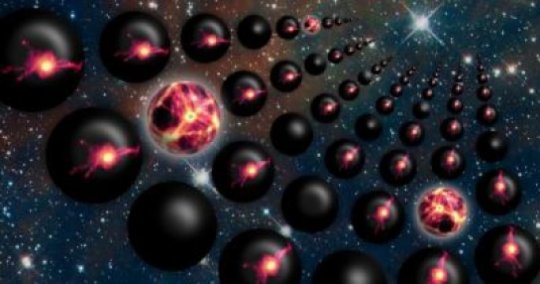A Multiverse — where our Universe is only one of many — might not be as inhospitable to life as previously thought, according to new research.
Questions about whether other universes might exist as part of a larger Multiverse, and if they could harbour life, are burning issues in modern cosmology, according to Science Daily.
Now new research, has shown that life could potentially be common throughout the Multiverse, if it exists.
The key to this, the researchers say, is dark energy, a mysterious “force” that is accelerating the expansion of the Universe.
Scientists say that current theories of the origin of the Universe predict much more dark energy in our Universe than is observed. Adding larger amounts would cause such a rapid expansion that it would dilute matter before any stars, planets or life could form.
The Multiverse theory, introduced in the 1980s, can explain the “luckily small” amount of dark energy in our Universe that enabled it to host life, among many universes that could not.
Using huge computer simulations of the cosmos, the new research has found that adding dark energy, up to a few hundred times the amount observed in our Universe, would actually have a modest impact upon star and planet formation.
This opens up the prospect that life could be possible throughout a wider range of other universes, if they exist, the researchers said.
Jaime Salcido, a postgraduate student said: “For many physicists, the unexplained but seemingly special amount of dark energy in our Universe is a frustrating puzzle.
“Our simulations show that even if there was much more dark energy or even very little in the Universe then it would only have a minimal effect on star and planet formation, raising the prospect that life could exist throughout the Multiverse.”
Dr Luke Barnes, a John Templeton Research Fellow, said: “The Multiverse was previously thought to explain the observed value of dark energy as a lottery — we have a lucky ticket and live in the Universe that forms beautiful galaxies which permit life as we know it.
“Our work shows that our ticket seems a little too lucky, so to speak. It’s more special than it needs to be for life. This is a problem for the Multiverse; a puzzle remains.”
Dr Pascal Elahi, Research Fellow said: “We asked ourselves how much dark energy can there be before life is impossible? Our simulations showed that the accelerated expansion driven by dark energy has hardly any impact on the birth of stars, and hence places for life to arise. Even increasing dark energy many hundreds of times might not be enough to make a dead universe.”
The researchers said their results were unexpected and could be problematic as they cast doubt on the ability of the theory of a Multiverse to explain the observed value of dark energy.
According to the research, if we live in a Multiverse, we’d expect to observe much more dark energy than we do — perhaps 50 times more than we see in our Universe.
Although the results do not rule out the Multiverse, it seems that the tiny amount of dark energy in our Universe would be better explained by an, as yet, undiscovered law of nature.
Professor Richard Bower, said: “The formation of stars in a universe is a battle between the attraction of gravity, and the repulsion of dark energy.
“We have found in our simulations that universes with much more dark energy than ours can happily form stars. So why such a paltry amount of dark energy in our Universe?
“I think we should be looking for a new law of physics to explain this strange property of our Universe, and the Multiverse theory does little to rescue physicists’ discomfort.”
N.H.Kh

